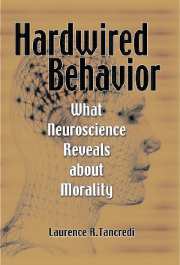Book contents
- Frontmatter
- Contents
- Preface
- Acknowledgments
- 1 Neuroscience and Morality
- 2 Morality and the Mind
- 3 Beyond the Mind Zone
- 4 The Moral Brain
- 5 Bad without Conscience
- 6 The Biology of Choice
- 7 Sex and the Single Moral Code
- 8 Brain Biology and Sex
- 9 Deception
- 10 The Biology of Money
- 11 The Bad and the Mad
- 12 Creating a Moral Brain
- Notes
- Glossary
- Index
7 - Sex and the Single Moral Code
Published online by Cambridge University Press: 13 October 2009
- Frontmatter
- Contents
- Preface
- Acknowledgments
- 1 Neuroscience and Morality
- 2 Morality and the Mind
- 3 Beyond the Mind Zone
- 4 The Moral Brain
- 5 Bad without Conscience
- 6 The Biology of Choice
- 7 Sex and the Single Moral Code
- 8 Brain Biology and Sex
- 9 Deception
- 10 The Biology of Money
- 11 The Bad and the Mad
- 12 Creating a Moral Brain
- Notes
- Glossary
- Index
Summary
At one point or another in an individual's life, questions about love and sex arise: Are we “normal”? What is “normal”? Are we capable of bonding, or achieving long-term relationships? Are we capable of being sexually moral? How can we determine our true sexual makeup – and how much control have we over this overwhelmingly important aspect of life? Do our desires shape us, or do we shape them?
In this chapter and the next we explore, through one case history of a young couple encountering difficulties in forming an enduring, worthwhile relationship, precisely these questions and how modern science has brought us closer to answers – though far from solutions. We'll explore universally intriguing subjects: sex, love, pleasure, and bonding – in humans and in animals. And we'll learn about the physiological, chemical, and biological role the brain plays in what may be life's most enduring mysterious issue.
Jodi and Art found themselves in what many would consider to be a disastrous relationship. They had been dating off and on for over a year. At twenty-eight, she was ten years his junior. Their families had been friends for some time; both families were affluent, and respected in their community. Jodi had attended Andover Academy in Massachusetts, and then Smith College, where she graduated with honors in English literature. Since graduation she had been working as an editor at a major New York publishing house.
Art had graduated from Yale University with a degree in biology and economics, and from Columbia Law School. He worked for a few years in the Manhattan District Attorney's office, became disillusioned with a career in law, and shifted his interests to investment banking.
- Type
- Chapter
- Information
- Hardwired BehaviorWhat Neuroscience Reveals about Morality, pp. 84 - 96Publisher: Cambridge University PressPrint publication year: 2005



